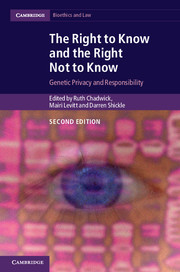Book contents
- Frontmatter
- Contents
- List of contributors
- Acknowledgements
- Introduction
- Part I Philosophical and legal issues
- 1 The right to know and the right not to know: the emerging debate
- 2 Autonomy and a right not to know
- 3 Privacy and the right not to know: a plea for conceptual clarity
- Part II Issues in genetics
- Part III Emerging issues
- Index
- References
3 - Privacy and the right not to know: a plea for conceptual clarity
Published online by Cambridge University Press: 05 September 2014
- Frontmatter
- Contents
- List of contributors
- Acknowledgements
- Introduction
- Part I Philosophical and legal issues
- 1 The right to know and the right not to know: the emerging debate
- 2 Autonomy and a right not to know
- 3 Privacy and the right not to know: a plea for conceptual clarity
- Part II Issues in genetics
- Part III Emerging issues
- Index
- References
Summary
Introduction
The contribution of this chapter is two-fold. First, it argues for conceptual clarity in the debates about the right to know and the right not to know by suggesting that the most appropriate framing mechanism to conduct such discussions – and ultimately to give effect to any such rights – is through an understanding of the symbiotic relationship between notions of personal autonomy and privacy. Importantly, the claim is made that the right to know and the right not to know should not be seen simply as two sides of the same conceptual coin. Different interests are at stake with each putative ‘right’, and, albeit overlapping, we cannot give proper effect to either right without this deeper understanding.
The second contribution of this chapter is to ask whether and how legal effect might be given to the most contentious of the two claims, that is, the right not to know. It is argued that current legal paradigms, nationally and internationally, fail to recognise the conceptual distinctiveness of this kind of right-claim and, accordingly, there is little chance of effective legal remedy for unwarranted disclosure of personal information to a person about themselves. This, however, should not be lamented given the subtle considerations and judgments that are in play. Discretion and not duty should be the watchword when it comes to recognising any so-called ‘right’ not to know.
- Type
- Chapter
- Information
- The Right to Know and the Right Not to KnowGenetic Privacy and Responsibility, pp. 38 - 52Publisher: Cambridge University PressPrint publication year: 2014
References
- 8
- Cited by

